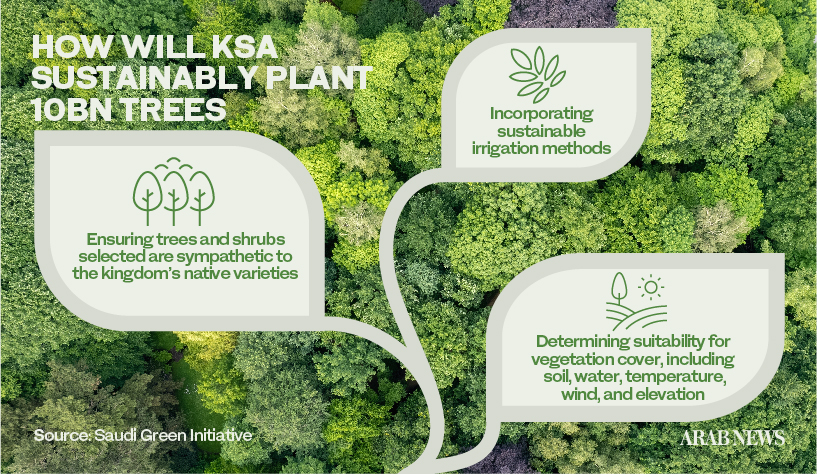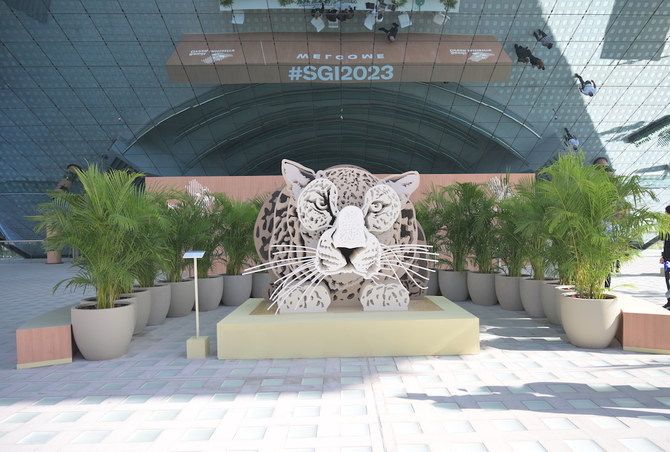RIYADH: Saudi Arabia is committing itself to a sustainable and green future through a variety of initiatives, with one of the most high-profile set to be held at the upcoming climate conference in Dubai.
Alongside the UN’s COP28 summit, the Kingdom will host the third edition of the Saudi Green Initiative Forum on Dec. 4 to highlight its dedication to build a greener future at a time of multibillion dollar giga-projects.
The event will gather influential figures, climate experts and thought leaders to present their insights and recommendations for tackling climate change.
It will also offer a platform to showcase the ambitions and achievements thus far of the SGI, launched in 2021 by Crown Prince Mohammed bin Salman.
SGI Gallery on the sidelines of #COP28
Displaying the breadth and depth of #ClimateAction initiatives led by entities projects and individuals across #SaudiArabia
Find out more about the #SGIGallery here
— Saudi Green Initiative (@Gi_Saudi) November 24, 2023
Established under the Vision 2030 initiative, SGI is an ambitious national plan focused on combating climate change, protecting the environment for future generations and improving the quality of life in the Kingdom.
It unites all the efforts towards Saudi Arabia’s mission of achieving net zero emissions by 2050 through the creation of a circular carbon economy. The Kingdom has also pledged to reduce carbon emissions by 278 million tons annually by 2030.
To achieve such aims, the Kingdom has committed itself to “greening,” which involves the development of an integrated system of conservation and afforestation strategies for the country’s various natural landscapes.
According to the website of King Abdullah University of Science and Technology, greening is set to “increase Saudi Arabia’s reliance on clean energy, offset carbon emissions, and protect the environment. It aims to improve quality of life and protect future generations.”
By 2030 Saudi Arabia plans to plant 600 million trees, restore 3.8 million hectares of land and champion biodiversity conservation as part of its 10-billion-tree initiative.

Additionally, as part of this greening initiative, SGI aims to develop an integrated system of conservation and afforestation strategies targeted at the Kingdom's diverse natural landscapes.
The task of overseeing the realization of the greening project has been entrusted to the National Center for Vegetation Cover Development and Combating Desertification.
“The NCVC is dedicated to expanding vegetation cover, combating desertification, conserving natural resources and biodiversity, safeguarding plant genetic resources, and pioneering the innovative solutions that address our environmental challenges,” Khaled bin Abdullah Al-Abdulkader, the organization’s CEO, told Arab News.
“We collaborate with all sectors including public, private, non-profit and the community to deliver sustainable outcomes,” he said, adding: “The NCVC has developed the strategic roadmap to guide the delivery of 10 billion trees for Saudi Arabia under the SGI. We are now moving from ambition to action, and we invite all innovators, entrepreneurs, scientists and interested parties to join us in our efforts.”
The Kingdom is the world’s second-largest major oil producer after the US. It has committed to driving the Middle East Green Initiative by seeking to unify stakeholders across the region to mitigate the impact of climate change on the region and meet global climate targets.
There are challenges, however, in achieving SGI’s ambitious targets due to Saudi Arabia’s arid landscape. It lacks rivers, lakes and regular rainfall and relies on dozens of facilities to transform water from the Gulf and Red Sea for its residents and the environment.
Saudi Arabia is also the largest country in the world without running surface water and has one of the highest rates of water consumption on the planet.
READ: For our coverage of the Saudi Green Initiative, click here
It has long been crucial and of national importance for the Kingdom to find new sources of potable water to support its growing population, and now it has to reach the targets set out in SGI.
“We will not use any desalination water for plantation,” Ahmad Al-Anazi, who leads the implementation of the National Environment Strategy and an advisor at the Ministry of Environment, Water, and Agriculture, told Arab News. “We will concentrate on using what they call renewable water for plantations.
The greening initiative, states Alanazi, offers the opportunity to retrieve more drinking water.
“We are responsible for enhancing the vegetation capital of the country overall,” he said, adding: “We are employing specialists to study all possible ways to plant trees and increase vegetation.”
“It’s not only a matter of planting trees,” Alanazi explained, adding: “It is also about how we then sustain the trees for the long term. This is a crucial aspect of sustainability, and we are conducting multiple studies on how to do this in this environment.”
Alanazi told Arab News that numerous experts are helping them achieve the Middle East Green Initiative to plant an additional 40 billion trees across the region.
According to SGI targets, the 10 billion trees earmarked for Saudi Arabia would help to rehabilitate 40 million hectares of land, improve air quality, restore vital ecological functions and reduce sandstorms.
Alanazi said two phases are involved in achieving the goals of the masterplan, with the first set to take place from 2024 to 2040.
“In this phase most of our focus will be on planting in nature, or what we call a natural based solution,” he said, adding: “This phase aims to plant 400 million trees in 3.8 hectares. The second phase is more comprehensive and aggressive and includes all domains and will be set forth from 2030.”
Further wins for Saudi Arabia’s green initiative were announced in early November when a consortium of clean energy leaders – Masdar, EDF Renewables and Nesma Company – announced the signing of a Power Purchase Agreement with the Saudi Power Procurement Company to develop the 1,100 megawatts Al Henakiyah solar power plant.
When operational, the $1 billion project is expected to power more than 190 thousand homes per year and displace more than 1.8 million tons of carbon dioxide annually.
“As Nesma’s flagship renewables business, Nesma Renewable Energy is intrinsic to our commitment to proactively support the clean energy and sustainability goals of Saudi Vision 2030,” Faisal Al-Turki, president of Nesma Group, said in a statement.
He added: “The Al Henakiyah Solar Project is a resounding endorsement of our position at the forefront of the renewables industry in Saudi Arabia.
“As an industry, we are on an ambitious journey together, and one that will ultimately establish Saudi Arabia as a true global leader in renewable energy generation. This project represents a significant milestone on our way to achieving this.”
The upcoming SGI forum during COP28 offers an opportunity to further address global climate issues while focusing on the Kingdom’s own aims, hurdles and achievements towards its climate goals.




























